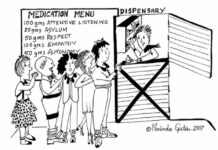That parental support can prevent the occurrence of delinquent behaviors in youth is well established. Now researchers are exploring what kinds of parental support facilitate these positive outcomes. Specifically, Glenn D. Walters of the Department of Criminal Justice at Kutztown University examined the role of empathy in the equation.
In his study, published last week in the Journal of Moral Education, Walters explored whether or not the presence of youth empathy strengthened the relationship between young people’s perceptions of parental support and their involvement in delinquent behavior. His results suggest that parental support leads to increases in empathy among young people, leading to reductions in delinquent activity.
“It is conceivable that parental support achieves its effect by encouraging empathy development, given how vital parenting can be in promoting empathy in early childhood,” Walters explains.
 There have been multiple models proposed for conceptualizing empathy. According to the framework applied in Walters’ work, empathy consists of three facets: affective, cognitive, and compassionate. All three components are included in the umbrella definition of empathy applied in his work: “the capacity to experience, understand, and act on the feelings of another.” Empathy exerts a powerful force beyond implications for social connections alone. For example, research has indicated that empathy-oriented instruction can improve students’ creative skills in science curricula.
There have been multiple models proposed for conceptualizing empathy. According to the framework applied in Walters’ work, empathy consists of three facets: affective, cognitive, and compassionate. All three components are included in the umbrella definition of empathy applied in his work: “the capacity to experience, understand, and act on the feelings of another.” Empathy exerts a powerful force beyond implications for social connections alone. For example, research has indicated that empathy-oriented instruction can improve students’ creative skills in science curricula.
Warm, supportive parenting correlates positively with positive youth outcomes such as prosocial behavior and empathy. There has been some conflicting research in this area regarding the question of reciprocity in parent-child support and empathy (i.e., do more empathetic children garner increased support/empathy from the adults in their life). Still, the significance of adult support in the development of prosocial behavior is consistently supported in research.
Past research has also established a relationship between parental support and delinquency such that increased parental support is associated with decreased youth delinquent behaviors in this way. In other words, decreased youth engagement in delinquent behaviors does not elicit parent support in the same way that parental support results in improvements to youth behaviors.
“The purpose of this study was to determine whether empathy is capable of mediating the relationship between perceived parental support and juvenile delinquency,” Walters writes.
This hypothesis was tested in path analysis of 3,865 (51% male) Australian schoolchildren (mean age = 12.4 years at first wave) using three waves of data with two years between each wave. The dependent variable (juvenile delinquency) was regressed onto cross-lagged independent and mediating latent variables (perceived parental support and empathy).
The data included in Walters’ work were drawn from the Longitudinal Study of Australian Children (LSAC), comprising abundant information corresponding with a nationally representative sample (N = 3,865) of young people across multiple cohorts and time points. Correlations and path analyses were conducted using selections from parental support, empathy, and delinquency data across the following age waves: participants at ages 12/13, participants at ages 14/15, and participants at ages 16/17.
To explicitly examine the role of empathy in the parental support and youth delinquency relationship, Walters controlled for other potential contributing variables including “demographic measures, perceived peer delinquency, perceived positive peer association, perceived parental knowledge, and inductive parenting” in his analyses.
The findings confirmed that empathy among young participants sampled mediated decreased delinquent behavior occurrences in young people with increased access to parental support. In essence, caregiver behaviors may inspire empathy in young people protective against engagement in antisocial or delinquent behaviors. Walters adds:
“The principal implication of this study is that parental support, as perceived by the child, apparently plays a small but significant role in the development of empathy in early adolescent youth. Empathy, in turn, may serve to reduce the child’s propensity for future delinquent involvement.”
Walters notes various limitations to his study, such as the unique makeup of the population sampled for this analysis, the scope of available empathy measures applied in research, and the absence of early childhood in the trajectory explored in this particular project. However, results strengthen the case that caregiver support may be instrumental in curbing youth delinquency by way of encouraging empathy.
Starting at home and likely spanning across settings, support from significant adults can go a long way in fostering skills necessary for young people to relate to others and engage pro-socially. Programs to provide parents with resources to support their children may be valuable in making use of this work’s implications.
****
Walters, G. D. (2021). In search of a mechanism: Mediating the perceived parental support–delinquency relationship with child empathy. Journal of Moral Education, 1–17. https://doi.org/10.1080/03057240.2021.1872511 (Link)















Poorly written, ambiguous, confusing. This article seemed to be suggesting a correlation between parents who receive support and reduced juvenile delinquency. Then almost at the end, was the clarification that kids who perceive greater amounts of support FROM their parents have reduced juvenile delinquency. And that is kind of a “duh” moment, no?
It seems that in 2021, we’d be ready to move on from elementary ideas that parents who are deeply concerned with their children’s wellbeing and show that in positive supportive ways produce healthier offspring (and conversely, struggling parents produce less healthy offspring) to identifying the factors that reduce parental involvement and support of their children and the ways that those conditions can be mitigated. Those factors are most likely to be along the lines of socioeconomic stressors, substance abuse, serious health conditions impacting the family, generational trauma, justice-involved parents, etc.
Many of the Progressive ideals that we have been fighting for on the federal and state levels would directly impact the conditions that negatively effect parental engagement and juveniles’ perceptions of their parents’ investment in them. Increasing the minimum wage, establishing a minimum income, child tax credits, a right to housing, free k-16 education, universal healthcare, restorative justice, parental leave, parental education, treating substance abuse as a public health issue, overhauling social services/CPS, designating the internet as a necessary public utility, etc.
Report comment
Gotta agree with most of that KS.
The first sentence notes the well established correlation between parental support and a reduction in youth ‘delinquency’ and the final conclusion would seem to be that kid’s perception of parental support correlates with reduced delinquency. The only ‘new’ finding would seem to be that if you support your kids they’ll probably come to believe you support them.
Walters’ contribution is to insert his wonky definition of empathy into the equation as a mediating factor because he thinks it belongs there, then to conclude it might belong there. The notion that empathy is the capacity to experience the feelings of others rather than to emotionally respond to imagining them would imply some kind of PSI power. Does this guy believe in the New Age concept of ’empaths’ or something?
He admits his scope for measuring what he calls empathy is limited then, so far as I can tell, establishes correlation between those dubious measures, parental support and decreased delinquency. How he then concludes empathy is therefore the mediating factor between the other two variables escapes me. Chronological sequence?
Report comment